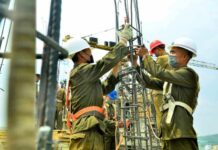
North Korea recently amended parts of its Law on Agriculture that pertains to the so-called “sub-workteam management system.” The amendments strengthen the role of the individual within the sub-workteams.
The sub-workteam management system aims to prevent lower productivity on socialist collective farms resulting from large-scale workteams by dividing the workforce into smaller production teams of 10 to 25 people.
In early August, North Korea announced that the Standing Committee of the Supreme People’s Assembly had altered the sub-workteam management system when it amended the Law on Agriculture on Aug. 3, sparking speculation that the country had begun abolishing the system.
Last Thursday, a Daily NK source in North Korea said that the law’s reform “allowed the adoption of the Individual Contract Work System within the sub-workteam management system” and was “aimed at boosting productivity of basic agricultural work units and improve the system.”
In short, the reform appears aimed at boosting food production through the motivation of farm workers by clarifying their individual domains, roles and responsibilities.
Starting in 2019, North Korea introduced the Individual Field Responsibility System on a trial basis at several farms in Hyesan, Yanggang Province and elsewhere. This system allowed private individuals to cultivate land on their own and led to partial improvements in productivity.
North Korea now appears to be moving in earnest to take this trial program nationwide after farmers responded well to it. There are even those who claim that the country may be taking steps to implement a private farming system.
That being said, the system may have difficulties boosting farmers’ motivation to work. According to the source, farmers must receive an exact share commensurate with the work they individually put into production and cultivation, but this part of the reform remains weak.
“You have to allow the people doing the farming to take more and sell it,” the source said. “You won’t encourage enthusiasm for work if you let the people doing the farming take only a bare minimum and give them no authority over calculating shares.”
In fact, when the Individual Field Responsibility System was adopted, farmer motivation did seem to improve, but farm workers were not always given the share they were promised and corruption arose in the distribution of shares. Food production barely increased as a result.
North Korea also appears to be trying to improve rural conditions and social perceptions of the countryside to bring more people to agricultural communities.
“The state is building agricultural housing to improve the lives of farmers and helping so that more young people volunteer to live in agricultural communities,” the source said. “The government’s trying to improve the negative social perception of agricultural communities held by people in the cities and elsewhere throughout the country and industrialize farming workplaces with a view to resolve the country’s food-related issues.”
Translated by David Black. Edited by Robert Lauler.
Daily NK works with a network of sources who live inside North Korea, China and elsewhere. Their identities remain anonymous due to security concerns. More information about Daily NK’s reporting partner network and information gathering activities can be found on our FAQ page here.
Please direct any comments or questions about this article to dailynkenglish@uni-media.net.

















